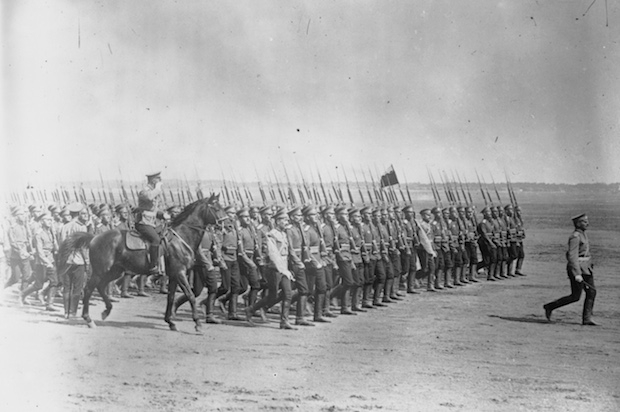From ‘News of the Week’, The Spectator, 3 July 1915:
During the week the Russians have been falling back in Poland and Galicia, and the Germans have been thrusting forward. The papers speak, indeed, of two million Germans invading Russia under Marshal von Mackensen. The Russian retreat, however, whether to the east or to the north, has been perfectly orderly, and the Germans have not made any material advance towards their main object, which, of course, is to destroy the Russian field armies. Indeed, the incidental fighting has in many places been favourable to the Russians. The hostile army on the Dniester, which has lately been reinforced by fresh troops, made a specially desperate effort to throw the Russian retirement towards the Gnila Lipa into confusion; but it not only failed to accomplish this, but suffered enormous losses. The German threats as to Warsaw are not likely to be fulfilled. We believe the Polish capital to be secure, and that what is most probable is that the Russian line will pivot upon it.
The situation may best be summed up by saying that the Russians are likely to go on retreating, indifferent whether the retreat is, as now, on Russian soil or in Galicia, until they feel they have drawn the enemy on far enough to be in danger, or till their own strength has been increased. Then, as so often in their history and so often in the present war, they will turn upon the Germans and smite them. Since Russia has had unfortunately to abandon her offensive, it may be said that the further she can induce the Germans to follow her armies into Russia, the better it will be for the cause of the Allies in the end, and the less likelihood there will be of the German troops being able to disengage themselves, or of their ever returning home again. Nothing would suit the Russians better, from the military point of view, than to see the Germans push on to Kiev, or, better still, to Smolensk. We need not, however, discuss military hypotheses of this description. The Germans will stop following the Russians long before they get anywhere near the places just named. The problem of the Germans, indeed, is how far they dare follow the wounded bear.






Comments